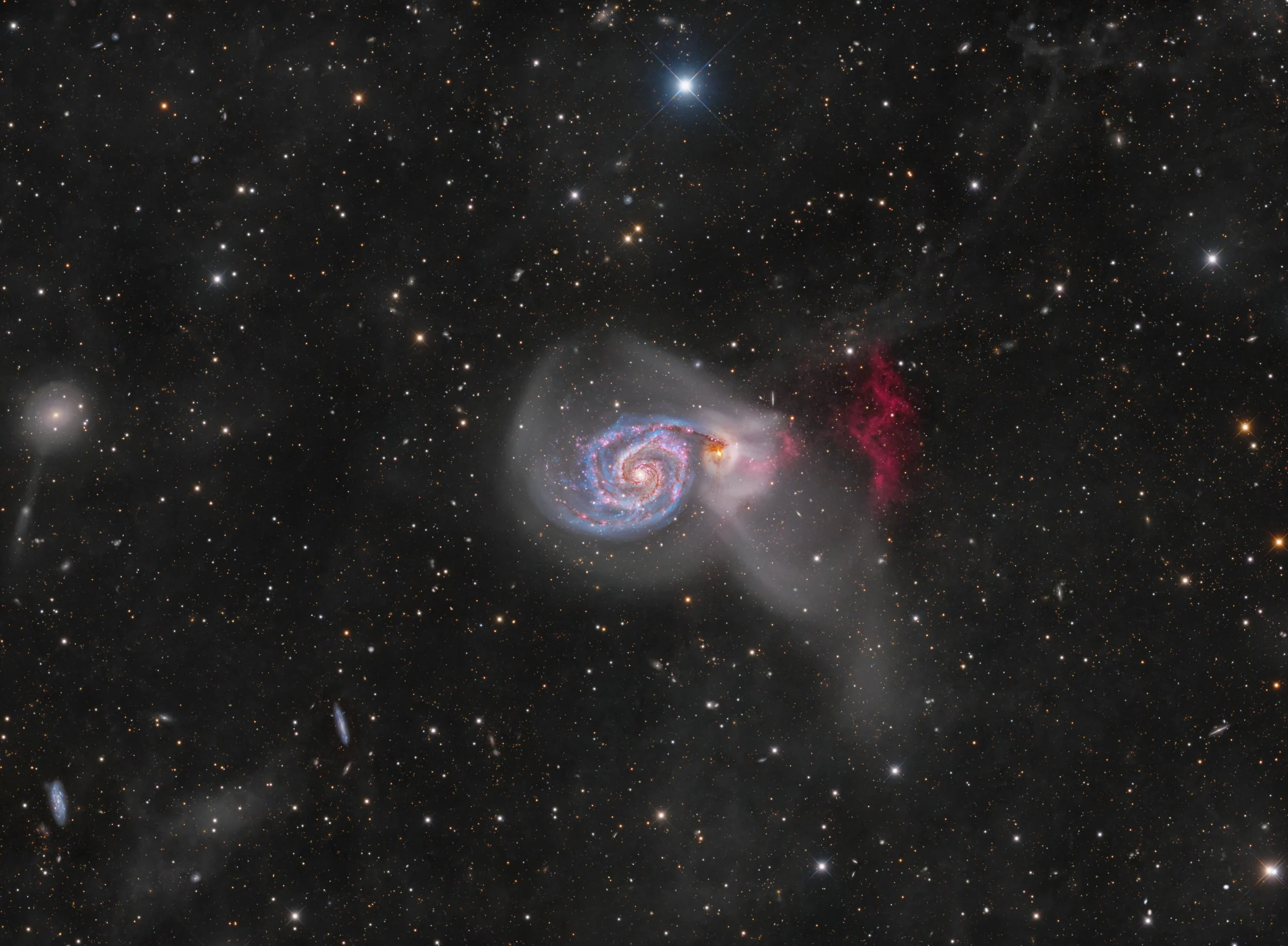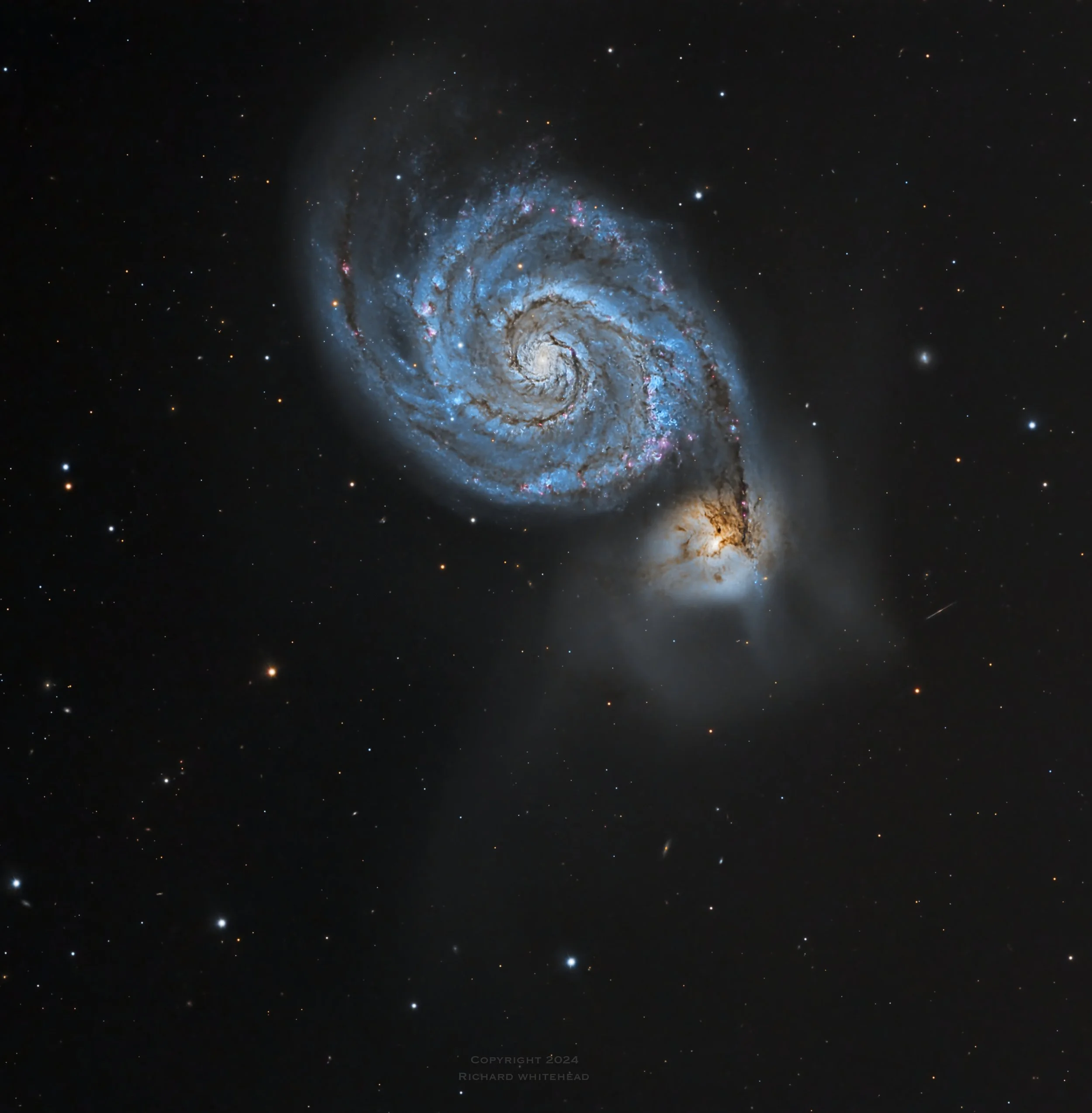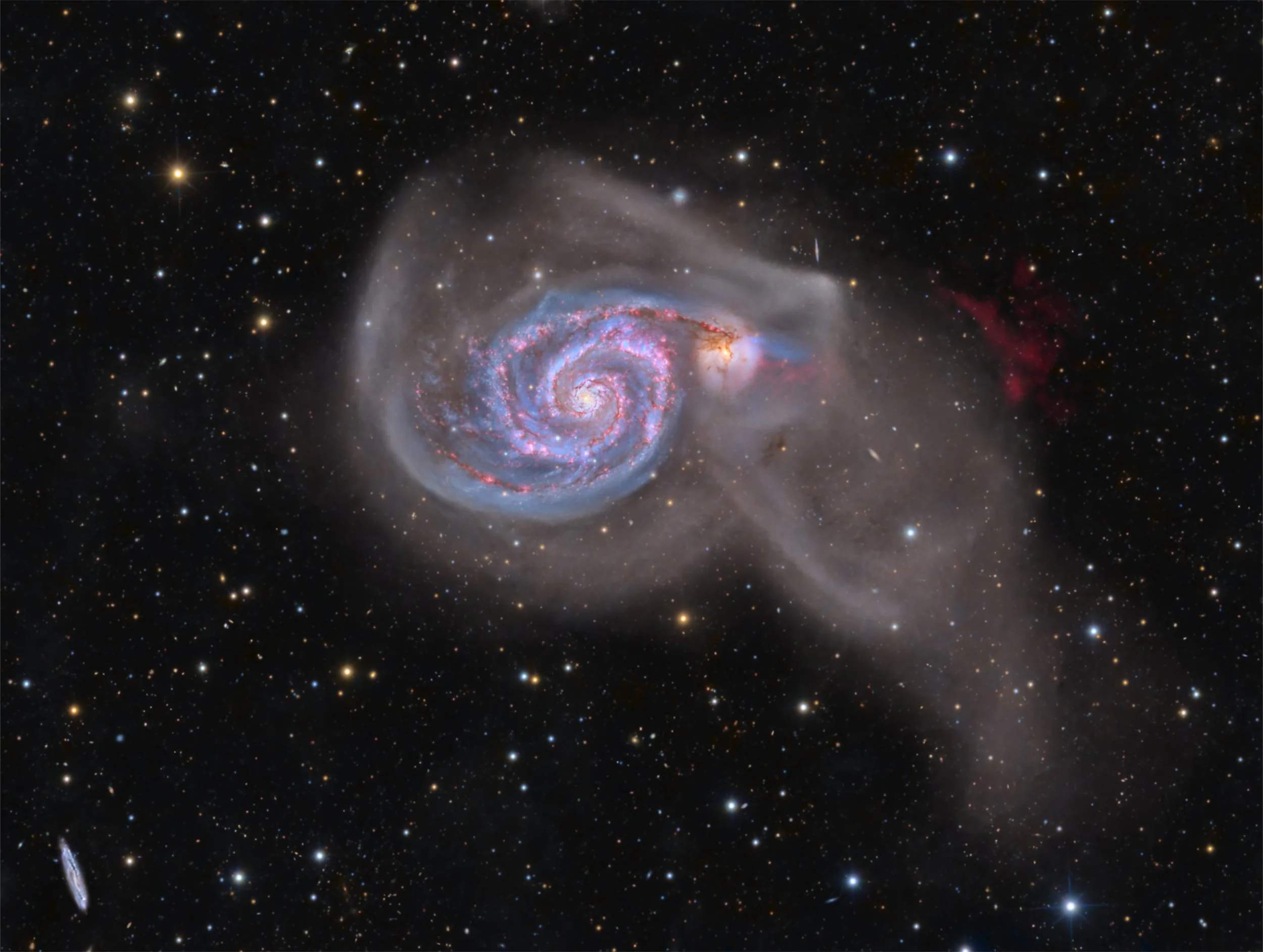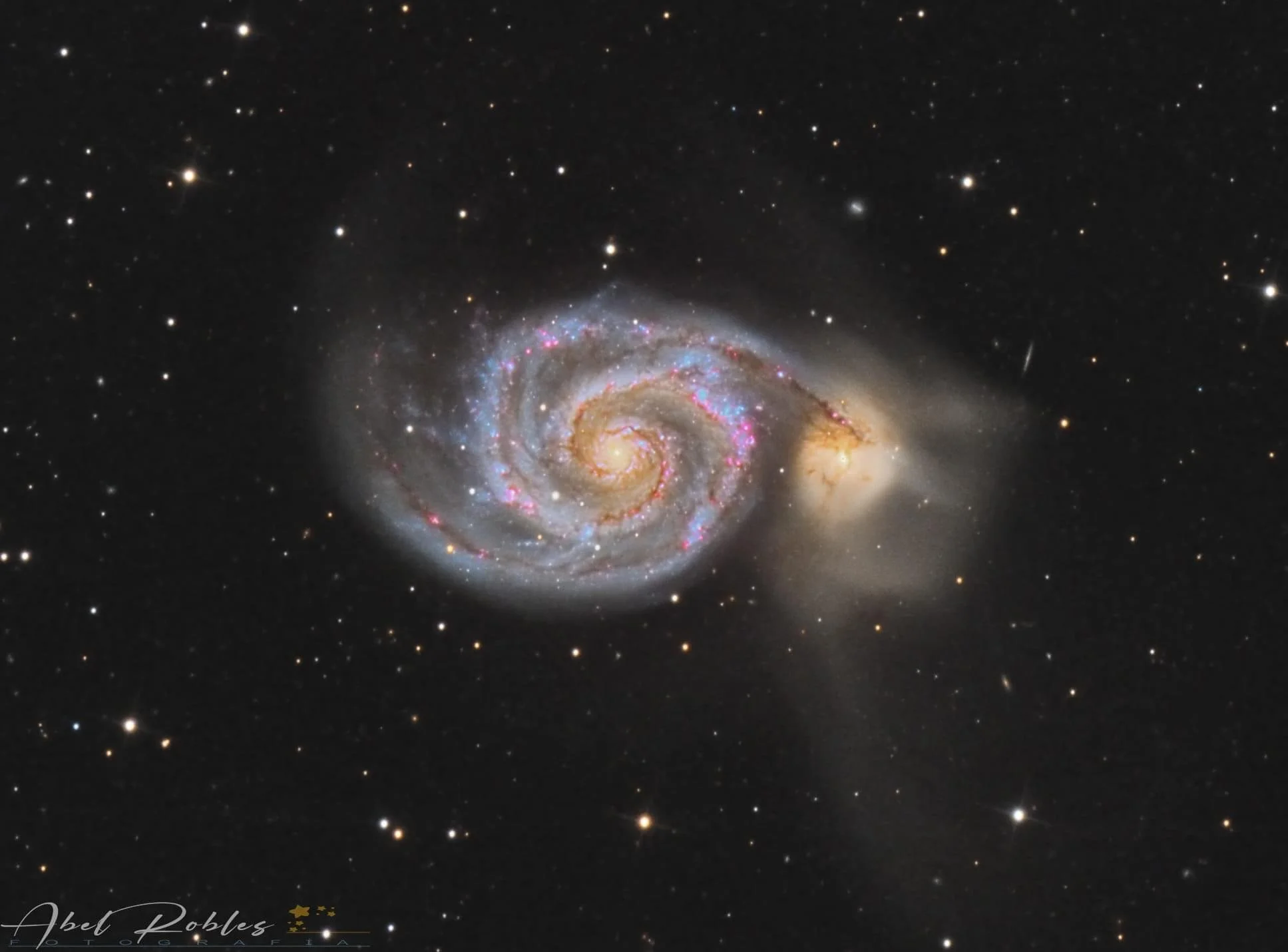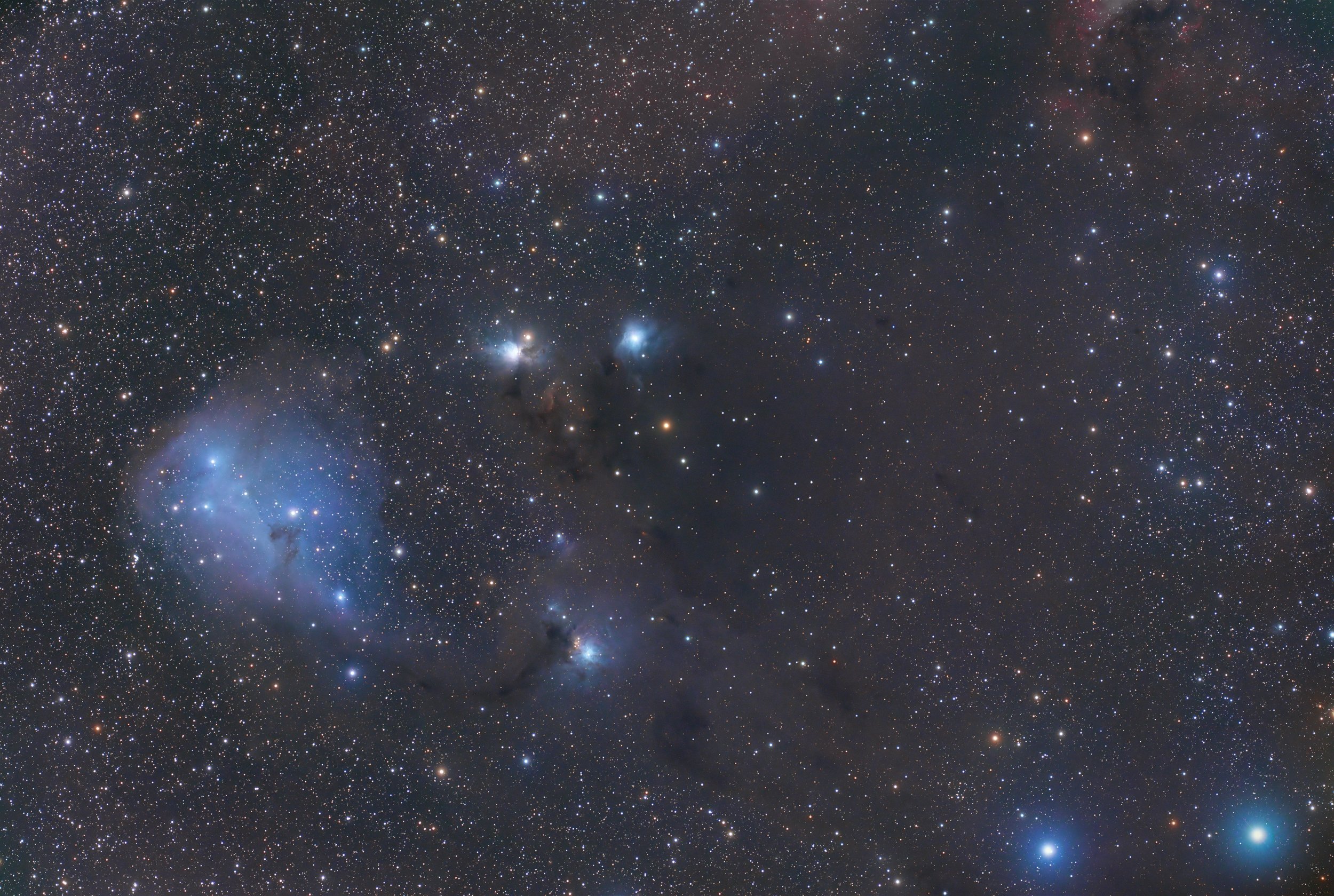
AAPOD2 Image Archives
Revisiting an old friend - M51 and its Ha cliffs
The Whirlpool Galaxy, also known as Messier 51 (M51), is a striking galaxy located in the constellation Canes Venatici. Situated approximately 23 million light-years away, this cosmic wonder spans a staggering 80,000 light-years in diameter.
M51 is a favorite target among astrophotographers due to its iconic spiral arms, which were first discovered in 1845 by William Parsons, the 3rd Earl of Rosse. This discovery also marked the first time spiral arms were detected in any celestial object.
One of M51’s most fascinating features is the prominent hydrogen-alpha (Hα) region near the galaxy, commonly referred to as the "Hα Cliffs." Capturing this faint structure poses a significant challenge, requiring exceptional dedication and skill. To fully unveil the cliffs, our team accumulated an incredible 383 hours of Hα data, with individual exposures averaging 1,300 seconds each.
The result is a breathtaking view that highlights not only M51’s distinctive spiral structure but also the delicate, glowing Hα regions that surround it.
M51 widefield
Messier 51, commonly known as the Whirlpool Galaxy, is a spiral galaxy located in the constellation Canes Venatici, at a distance of 31 million light-years. It was discovered by French astronomer Charles Messier on October 13, 1773, while observing a comet. Years later, in 1781, Messier's disciple, Pierre Méchain, discovered M51's companion, which they named M51B. M51 Whirlpool Galaxy.
M51 and distant background Galaxies
The iconic whirlpool galaxy, M51, takes center stage in this stunning astrophotograph, surrounded by a backdrop of distant background galaxies. Located approximately 23 million light-years away in the constellation Canes Venatici, M51 showcases its spiral arms adorned with bright knots of star formation and intricate dust lanes. Its gravitational influence is evident as it interacts with smaller companion galaxies, creating tidal tails and triggering bursts of new stellar activity.
Amidst the serene expanse of space, the faint glimmers of distant background galaxies add depth to the cosmic tapestry. Each speck of light represents a distant island universe, billions of light-years away from our own Milky Way galaxy. Together, they form a breathtaking vista of celestial splendor, inviting viewers to contemplate the vastness of the cosmos and the interconnectedness of galaxies across the universe.
Unveiling hidden features in M51 using 255hours
In a mesmerizing display of cosmic interaction, the Whirlpool Galaxy, also known as M51, unveiled its spiraling arms and intricate features in a stunning astronomical photo that resulted from a 255-Hour Collaboration! This captivating galaxy, located in the constellation Canes Venatici, stood as a prime example of a grand design spiral, with its graceful arms adorned by bright knots of star formation. The exquisite interaction between M51 and its smaller companion galaxy, NGC 5195, was showcased in this image, demonstrating the profound influence of gravitational forces in shaping the evolution of galaxies. The intricate details of M51's structure offered a window into the marvels of galactic dynamics, inviting us to contemplate the vast and ever-evolving tapestry of the universe.
M51 Whirlpool Galaxy
Object Messier 51, or Ngc 5194 the known Swirl Galaxy, is a spiral type, is in full collision interacting with another galaxy by the force of gravity attracted among each other.
It is located about 23 million light years from Earth 🌏 in the constellation Canes Venatici.
Team used;
Telescope 🔭 Newton 200/1000 modified
Camera; Zwo ASI1600mm+EFW 7x2"
filters; Baader 2" L-RGB
Mounting; Skywatcher Eq6r-pro
Guide; Ts60/240mm+ZwoAsi462mc
Self-focus; Rb-focus Merlin prototype
Smarbox; Gaius Rb-focus
Rb-focus carbon fiber spider
Noctua fan.
Capture details;
Date; 24/April/2020
Captures; Mallorca
Sky Class; Bortle 4
25x180s L -15°
22x180s R -15°
22x180s. G. - 15°
22x180s B -15°
15x180s Ha - 15°
30 ~ Darks
25 ~ Flats
5h 18" of full integration
Sequence done with NINA, assisted with Ascom Eqmod, Phd2, Image calibration, stacked and processed with Pixinsight 1.8 Repley, signed on Ps2022
copyright: Abel Borrasca
M51 HaLRGB
Image Description and Details :
The Whirlpool Galaxy is a classic spiral galaxy. Known as M51 and NGC 5194, this galaxy may have been the first galaxy for that identified spiral structure. It is located at a distance of 30 million light years from the Sun. Measuring 60,000 light-years across, it is one of the brightest and most beautiful galaxies in the sky. The Whirlpool Galaxy can be seen with good binoculars in the constellation Canes Venatici. The M51 galaxy belongs to the Sc type spiral galaxies and is the main member of a whole group of galaxies. Astronomers suggest that the appearance of the spiral structure of the galaxy M51 is mainly due to the gravitational influence of a small satellite galaxy NGC 5195.
Also in the picture, next to M51, you can see the galaxies IC4277, IC4278 plus many small galaxies in the background.
This image was originally intended to capture an extragalactic hydrogen cloud near M51. However even 22 hours of exposure through the Ha filter gave no hint of it.
Own remote observatory, 50 km from Kiev, Bortle 4 zone. Imaged during February - June 2021. AZ-EQ6 mount, ONTC8 newton, QHY22. Guide - OAG with Lodestar camera.
Astrodon 5nm Ha: 88 x 900s;
Astrodon L: 228 x 300s;
Astrodon R: 40 x 300s;
Astrodon G: 40 x 300s;
Astrodon B: 70 x 300s;
Total exposure - 53 hr.
Captured in SGP, processed in Pixinsight.
Copyright: Sergiy Vakulenko
M51 - Whirlpool galaxy
Image Description and Details :
M51 is an interacting galaxy, in the constellation Canes Venati. It is one of the most beautiful example of spiral galaxy, and quite easily observed for an amateur astronomerTechnical data :Newton SkyWatcher 200/1000 EQ6-r proASI 2600 MC proComa corrector Baader MPCC Mk IIIAutoguiding OAG + ZWO ASI 290mm miniZWO EAFASIAIR Pro69*300" : 5h45'Gain 100 - Temp -20°CProcessing PixInsight + Photoshop CC
Copyright: Yann Mevel
M51
Telescope: Newton GSO 250MM F/4.9
Sensor: CCD MORAVIAN G2 8300
Mount: Neq6
OAG: Ts D-King
Guide Camera: Lodestar
FilterWheel: Starlight Xpress
COPYRIGHT: Fabio Mortari


